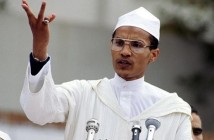(Reuters) – Muslim Americans are now more optimistic about their lives than any other major American faith group as their economic well-being improves and they feel more politically enfranchised.
A Gallup study released on Tuesday found 60 percent of Muslim Americans surveyed reported they were “thriving”, slightly higher than for Americans of any other religion except for Jews, who edged them out of the top spot by one percentage point.
Pollsters noted in particular the rapid surge in positive sentiment among Muslim Americans. The percentage of Muslims who were “thriving” grew by 19 points since 2008, double that of any other major faith group.
“Muslim Americans are happier and more optimistic today than at the end of 2008,” Dalia Mogahed, director of the Abu Dhabi Gallup Center, told Reuters by telephone.
“Muslim Americans today feel a greater sense of belonging in their country,” she added. Only three percent of Muslim Americans said they were suffering, while 37 percent said they were struggling.
Authors of the study said they attributed the change in outlook to improved economic conditions and a sense of more political enfranchisement since the election of President Barack Obama, a Christian with Muslim family roots who has reached out to Muslim communities worldwide.
The report said Obama’s approval rating among Muslim Americans was 80 percent, and that 46 percent, or a plurality, of Muslim Americans identified as Democrats, compared to only 9 percent who identified as Republicans.
“They may see Obama as promoting policies that are more in keeping with their own political views than those of former President George W. Bush,” the report said.
Muslim Americans also felt, to the tune of 64 percent, that their standard of living was getting better, up from 55 percent in 2009 and 46 percent in 2008.
CHALLENGES
The report, which focused on civic and spiritual engagement as well as overall well-being, said the improvements in Muslim sentiment came despite continuing controversies.
Those included a controversy surrounding a plan to build a Muslim cultural center and mosque near the site of New York’s September 11 Al Qaeda attack, and hearings on Islamic extremism called by U.S. Representative Peter King, which critics viewed as a witch-hunt.
A Christian preacher also caused an uproar last year by threatening to burn the Koran, and put himself back in the spotlight in March after incinerating Islam’s holy book.
“Despite some of these perceived attacks on the community, they are feeling better overall about their lives, about their country’s leadership,” Mogahed said.
Some 89 percent of Muslim Americans said that violent attacks on civilians were never justified, compared to between 71 and 79 percent of other religious groups who felt the same way.
“The finding is surprising because much of the rhetoric has been that the community hasn’t been vocal enough in its rejection of terrorism,” Mogahed said.
Jewish Americans had some views in common with Muslim Americans. A majority of Americans from both faiths agreed on a two-state solution in the Israeli-Palestinian conflict.
Jewish Americans were also the most likely religious groups, besides Muslims themselves, to believe that Muslim Americans were loyal to the United States. Some 80 percent of Jews said this, compared to 59 percent of Catholics and 56 percent of Protestants.
“There is an untapped resource, and relationship and a possible coalition between Muslim and Jewish Americans,” Mogahed said.
Muslim Americans continued to have a deep skepticism toward law enforcement and foreign policy. Some 60 percent of Muslim Americans had confidence in the FBI, while 70 percent had confidence in the military, the lowest of any group.
Gallup said the study was one of the most expansive of Muslim American public opinion to date. Instead of finding respondents by selecting people with Islamic-sounding names or going to parts of the country with large Muslim populations, the study is drawn from a random selection of U.S. households.
Gallup said it interviewed 3,883 self-identified Muslim American adults from January 2008 to April 9, 2011. The margin of error or confidence level in the data is 95 percent, Gallup said.
(Editing by Cynthia Johnston and Greg McCune)






